七年级英语仁爱版下册复习.
2022-2023学年第二学期仁爱英语七年级下册Unit6复习课

语法加油站
重点知识点
• 1. in front of与in the front of的区别 • in front of 在……的前面(在范围之外的前面) • in the front of在……的前面(在范围内的前面) eg:
• There is a pool _in__f_ro_n__t _o_f_his house. (在...外面)
17. 在交通事故中___i_n__t_ra__ff_i_c__a_c_c_i_d_e__n_t_s_____ 18. 遵守交通规则___o__b_e_y__t_h_e__t_r_a_f_fi_c__r_u_l_e_s___ 19. 看两边 _________l_o_o__k_b__o_t_h__w__a_y_s_________ 20. 在街上玩________p_l_a_y__o_n__t_h_e__s_t_r_e_e_t______ 21. 我们所有人 _____a_l_l _o_f__u_s_________________ 22. 超速罚款单_____a__t_i_c_k_e_t__f_o_r_s__p_e_e__d_in__g___ 23. 不要迟到。_____D__o_n__’t__b_e__l_a_t_e_.__________ 24. 小心____________b_e__c__a_r_e_f_u_l_______________
9. 失去生命_______lo__s_e__o_n__e_’s__l_i_fe___________ 10. 需要做某事___n__e_e_d__t_o__d_o__s_t_h__. __________ 11. 保证安全 _____k_e_e_p___s_a_f_e_________________ 12. 换乘2路公交车c_h__a_n_g__e__to__t_h__e_N__o_._2__b_u__s__ 14. 受伤__________g_e__t/_b_e__h__u_r_t_______________ 15. 禁止右转。___N__o__r_ig__h_t_t_u__rn__._____________ 16. 禁止停车。___N__o__p_a_r_k__in__g_._______________
2024年最新仁爱版七年级英语(下册)期末试卷及答案(各版本)
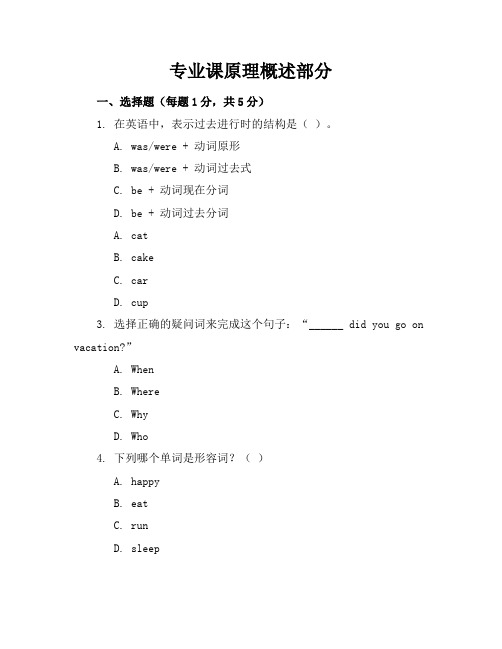
专业课原理概述部分一、选择题(每题1分,共5分)1. 在英语中,表示过去进行时的结构是()。
A. was/were + 动词原形B. was/were + 动词过去式C. be + 动词现在分词D. be + 动词过去分词A. catB. cakeC. carD. cup3. 选择正确的疑问词来完成这个句子:“______ did you go on vacation?”A. WhenB. WhereC. WhyD. Who4. 下列哪个单词是形容词?()A. happyB. eatC. runD. sleep5. “I ______ my homework every day.” 下列哪个词填空最合适?A. doB. doingC. didD. does二、判断题(每题1分,共5分)1. 英文句子的基本结构是主语+谓语+宾语。
()2. “ing”形式的动词可以用作形容词。
()3. 所有动词的过去式都是在其原形后加“ed”。
()4. “How old are you?”是询问对方年龄的正确方式。
()5. 英文中的疑问句总是以助动词或情态动词开头。
()三、填空题(每题1分,共5分)1. I ______ (be) a student.2. She ______ (go) to the park yesterday.3. They often ______ (play) soccer after school.4. My mother ______ (cook) dinner now.5. Can you help me ______ (find) my pen?四、简答题(每题2分,共10分)1. 请写出英语中一般现在时的构成。
2. 简述there be句型的用法。
3. 描述一下如何用英语询问时间。
4. 请举例说明什么是名词。
5. 解释一下什么是主语。
五、应用题(每题2分,共10分)1. 请将下列句子改为一般疑问句:“He reads a book every evening.”2. 用介词“in”填空:“I usually get up ______ the morning.”3. 请将下列句子改为否定句:“They can swim.”4. 请用“like”完成这个句子:“She ______ apples.”5. 请将下列句子改为过去进行时:“It rains.”六、分析题(每题5分,共10分)1. 分析下列句子的时态:“She will go to the library after school.”2. 请解释下列句子中划线词的词性及其在句中的作用:“Thesun sets in the west.”七、实践操作题(每题5分,共10分)1. 请用英语编写一个关于你上周末活动的对话。
仁爱版七年级(下册)知识点要点总结

仁爱版七年级(下册)知识点要点总结本学期研究的知识点包括:
语文
- 形音义的关系
- 修辞手法的运用
- 古诗文的鉴赏
- 现代文阅读与写作
数学
- 相反数与绝对值
- 分数加减乘除
- 二次根式与平方根
- 整式的加减乘除
英语
- 现在进行时
- 祈使句
- 简单过去式
- 数词与日期
历史
- 秦汉和尚书制的改革- 西汉时期的政治和军事- 东汉时期的政治和文化- 三国时期的政治和文化
生物
- 细胞的基本结构和功能- 生物多样性的认识
- 植物的结构和生长
- 动物的体内环境和调节
地理
- 中国的地理位置和自然地理条件
- 中国的人口与经济
- 中国的交通和旅游
- 国际热点问题的认知
政治
- 报告的主要内容
- 中国特色社会主义的本质特征
- 社会主义核心价值观的内涵与精神实质
- 当前的国际形势和中国与世界的关系
以上是本学期主要的知识点汇总。
在学习各科知识的同时,要
注意拓展视野、强化思维训练,努力提高语言表达能力、计算能力、探究能力和综合应用能力。
(完整版)仁爱版七年级英语下册知识点总结
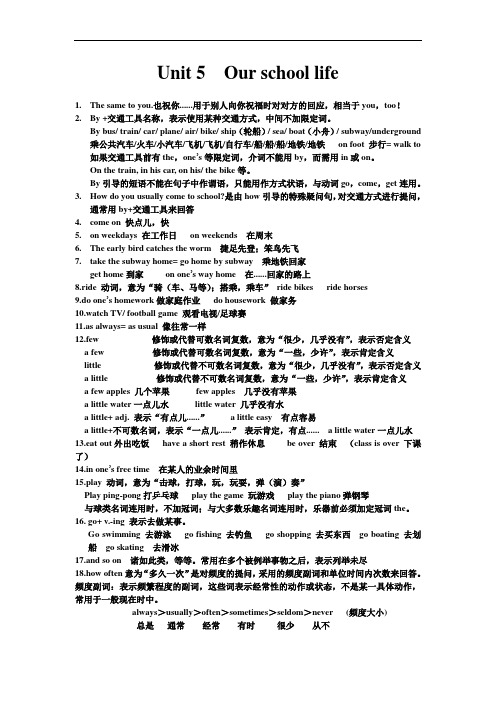
Unit 5 Our school life1.The same to you.也祝你......用于别人向你祝福时对对方的回应,相当于you,too!2.By +交通工具名称,表示使用某种交通方式,中间不加限定词。
By bus/ train/ car/ plane/ air/ bike/ ship(轮船)/ sea/ boat(小舟)/ subway/underground 乘公共汽车/火车/小汽车/飞机/飞机/自行车/船/船/船/地铁/地铁on foot 步行= walk to 如果交通工具前有the,one’s等限定词,介词不能用by,而需用in或on。
On the train, in his car, on his/ the bike等。
By引导的短语不能在句子中作谓语,只能用作方式状语,与动词go,come,get连用。
3.How do you usually come to school?是由how引导的特殊疑问句,对交通方式进行提问,通常用by+交通工具来回答e on 快点儿,快5.on weekdays 在工作日on weekends 在周末6.The early bird catches the worm 捷足先登;笨鸟先飞7.take the subway home= go home by subway 乘地铁回家get home到家on one’s way home 在......回家的路上8.ride 动词,意为“骑(车、马等);搭乘,乘车”ride bikes ride horses9.do one’s homework做家庭作业do housework 做家务10.watch TV/ football game 观看电视/足球赛11.as always= as usual 像往常一样12.few 修饰或代替可数名词复数,意为“很少,几乎没有”,表示否定含义a few 修饰或代替可数名词复数,意为“一些,少许”,表示肯定含义little 修饰或代替不可数名词复数,意为“很少,几乎没有”,表示否定含义a little 修饰或代替不可数名词复数,意为“一些,少许”,表示肯定含义a few apples 几个苹果few apples 几乎没有苹果a little water一点儿水little water 几乎没有水a little+ adj. 表示“有点儿......” a little easy 有点容易a little+不可数名词,表示“一点儿......”表示肯定,有点...... a little water一点儿水13.eat out外出吃饭have a short rest 稍作休息be over 结束(class is over 下课了)14.in one’s free time 在某人的业余时间里15.play 动词,意为“击球,打球,玩,玩耍,弹(演)奏”Play ping-pong打乒乓球play the game 玩游戏play the piano弹钢琴与球类名词连用时,不加冠词;与大多数乐趣名词连用时,乐器前必须加定冠词the。
仁爱版英语七年级下全部知识点总结
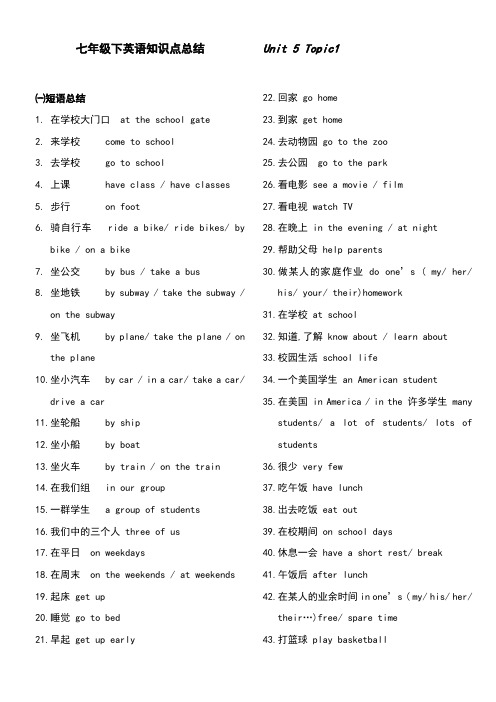
七年级下英语知识点总结Unit 5 Topic1㈠短语总结1.在学校大门口 at the school gate2.来学校 come to school3.去学校 go to school4.上课 have class / have classes5.步行 on foot6.骑自行车 ride a bike/ ride bikes/ bybike / on a bike7.坐公交 by bus / take a bus8.坐地铁 by subway / take the subway /on the subway9.坐飞机 by plane/ take the plane / onthe plane10.坐小汽车 by car / in a car/ take a car/drive a car11.坐轮船 by ship12.坐小船 by boat13.坐火车 by train / on the train14.在我们组 in our group15.一群学生 a group of students16.我们中的三个人 three of us17.在平日 on weekdays18.在周末 on the weekends / at weekends19.起床 get up20.睡觉 go to bed21.早起 get up early 22.回家 go home23.到家 get home24.去动物园 go to the zoo25.去公园 go to the park26.看电影 see a movie / film27.看电视 watch TV28.在晚上 in the evening / at night29.帮助父母 help parents30.做某人的家庭作业 do one’s ( my/ her/his/ your/ their)homework31.在学校 at school32.知道,了解 know about / learn about33.校园生活 school life34.一个美国学生 an American student35.在美国 in America / in the 许多学生 manystudents/ a lot of students/ lots of students36.很少 very few37.吃午饭 have lunch38.出去吃饭 eat out39.在校期间 on school days40.休息一会 have a short rest/ break41.午饭后 after lunch42.在某人的业余时间in one’s ( my/ his/ her/their…)free/ spare time43.打篮球 play basketball44.踢足球play soccer / football45.弹钢琴 play the piano46.弹吉他play the guitar47.拉二胡 play erhu48.去游泳 go swimming / go for a swim49.去划船 go boating50.球赛 a ball game / ball games51.一年四次 four times a year52.听音乐 listen to music53.读书 read books54.看报 read newspapers 55.看医生 see a doctor56.去图书馆 go to the library57.一周两次 twice a week58.见朋友 meet friends59.每天 every day60.在七点半 at half past seven61.一小会 for a little while / for a shorttime62.晚饭后 after supper63.吃饭 have dinner64.吃早饭 have breakfast㈡重要句型1.I usually come to school by subway.同义句: I usually take the subway to school.对划线部分提问: How do you usually come to school类似的有:go to school by bike=go to schoolon a bike= ride a bike to school=ride to schoolgo home by bus=go home on a bus=take a bus home2.How do you usually/ often…你通常/经常怎样…3.It’s time for class.=It’s time to haveclass. =It’s time for having class.4.What about you =How about you5.How often …询问频率,回答可以用频率副词:always, usually, often, sometimes, seldom, never, every day ,every +其他时间名词或表示频率的短语回答表示频率的短语:次数+单位时间. : once a day / twice a week / three timesa month6. The early bird catches the work. (谚语) 笨鸟先飞7. Work / Study must come first. 工作/ 学习必须放在第一位!8. Classes begin at eight. =Class begins at eight.提问: What time does the class begin / What time do the classes begin㈢重要单词的用法1.look (感官动词) 看起来,后面加形容词His mother looks very young.They look very cute.Her dress looks very nice.You look very cool in this coat.2.by 介词by 后面直接加表示交通工具的名词,中间不用任何词修饰,如:by bikeby +动词ing形式,表示通过某种方式People show love to their mothers by giving cards.You can be a good student by working hard.3.over (形容词)School / Class is over.4.begin现在分词: beginning 过去式: beganbegin to do sth , begin doing sthHe begins to write a letter. =He begins writing a letter.如果begin本身为分词,只能用begin to do sthHe is beginning to run.5.listen to 听(动作), hear 听见(结果)6.always 反义词 never7.本话题涉及的时态为一般现在时,句中常有频率副词或表示频率的短语,如果主语为三单,动词一定要用三单!(四)易错题1.You new watch ______ (look) very nice!2.Here ______(be) some news.3.Oh, come on! It’s time_____ going toschool.4.They usually go to school on________(feet).5.In my class, forty of _______(we) go toschool by bike.6.The early bird ______ (catch) the worm.7.Kangkang often _____ (ride) a bike to thepark.8.What time _____ (be)school over9.Work must come ______(once).10.It’s time ____you to get up.11.We often _____ books in the morning.12.Jill’s friend like ______(study) in ourschool.13.Mr. Wang teaches ______(we) English._____ of us like him.14.How about ______(go) out with me15.Most students go to school _____ theschool bus.16._______ do you go shopping with yourmotherA. How soonB. How farC. How oftenD. How much17.What time do you usually get up _____weekdays18.He ______ busy, so he has no time to playwith us.A. is alwaysB. seldom isC. always isD. often is19. The last class______(finish) at twelve o’clock.20. Let’s go______(boat).21. It’s time to have breakfast. (同义句) _________________________________________ _____________.22. Michael often rides a bike to school. (同义句)_________________________________________ _____________.23. I always go to work on foot. (对划线部分提问)_________________________________________ _____________.24. My mother goes shopping twice a week. (对划线部分提问)_________________________________________ _____________.25. Mary always reads books in the library. (反义句)_________________________________________ _____________.26. He usually does his homework at school. (否定句)_________________________________________ _____________.27. They often go to school by bus in the morning. (对划线部分提问)_________________________________________ _____________.28. Jane seldom watches TV on weekdays. (改为一般疑问句)_________________________________________ _____________.29. He usually has lunch at home. (对划线部分提问)_________________________________________ _____________.30. Li Ping often goes to work on foot. (同义句)_________________________________________ _____________.31. 几乎没有学生乘地铁去学校。
仁爱英语七年级下期末总复习易错题汇总(经典)
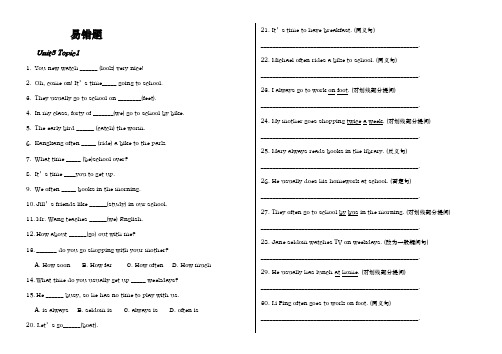
易错题Unit5 Topic11.You new watch ______ (look) very nice!2.Oh, come on! It’s time_____ going to school.3.They usually go to school on ________(feet).4.In my class, forty of _______(we) go to school by bike.5.The early bird ______ (catch) the worm.6.Kangkang often _____ (ride) a bike to the park.7.What time _____ (be)school over?8.It’s time ____you to get up.9.We often _____ books in the morning.10.Jill’s friends like ______(study) in our school.11.Mr. Wang teaches ______(we) English.12.How about ______(go) out with me?13._______ do you go shopping with your mother?A. How soonB. How farC. How oftenD. How much14.What time do you usually get up _____ weekdays?15.He ______ busy, so he has no time to play with us.A. is alwaysB. seldom isC. always isD. often is20. Let’s go______(boat). 21. It’s time to have breakfast. (同义句)______________________________________________________.22. Michael often rides a bike to school. (同义句)______________________________________________________.23. I always go to work on foot. (对划线部分提问)______________________________________________________.24. My mother goes shopping twice a week. (对划线部分提问)______________________________________________________.25. Mary always reads books in the library. (反义句)______________________________________________________.26. He usually does his homework at school. (否定句)______________________________________________________.27. They often go to school by bus in the morning. (对划线部分提问) ______________________________________________________.28. Jane seldom watches TV on weekdays. (改为一般疑问句)______________________________________________________.29. He usually has lunch at home. (对划线部分提问)______________________________________________________.30. Li Ping often goes to work on foot. (同义句)______________________________________________________.31. 几乎没有学生乘地铁去学校。
仁爱版英语七年级下册知识点复习归纳(完整版)

仁爱版英语七年级下册知识点复习归纳(完整版)Ren'ai English Grade 7 Unit 5 Topic 1 ReviewKey Grammar: Present Simple Tense (often used with adverbs of frequency such as never。
seldom。
sometimes。
often。
usually。
always)Key XXX:How do you usually come to school?I usually come to school by subway.How often do you go to the library?XXX/Three times a week/Very often/Every day/SeldomXXX:1.I always come to school by bus。
"By" is used with the name of a n method。
without any articles in een。
If there is an article such as "a," "the," or "my" in front of the n method。
"in" or "on" should be used instead。
For example。
"on the train" is the same as "by train," "on his bike" is the same as "by bike," and "inmy car" is the same as "by car." To distinguish een "on foot" and "walk," "on foot" means "walking" XXX but only as an adverb of manner at the end of a sentence。
仁爱版七年级下册英语复习知识点
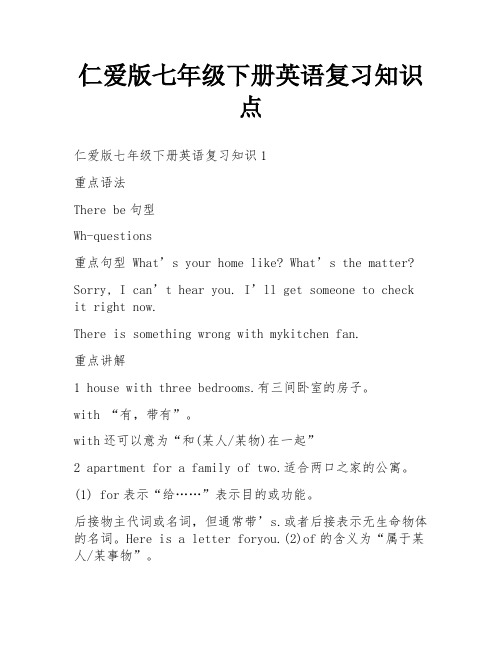
仁爱版七年级下册英语复习知识点仁爱版七年级下册英语复习知识1重点语法There be句型Wh-questions重点句型What’s your home like? What’s the matter?Sorry, I can’t hear you. I’ll get someone to check it right now.There is something wrong with mykitchen fan.重点讲解1 house with three bedrooms.有三间卧室的房子。
with “有,带有”。
with还可以意为“和(某人/某物)在一起”2 apartment for a family of two.适合两口之家的公寓。
(1) for表示“给……”表示目的或功能。
后接物主代词或名词,但通常带’s.或者后接表示无生命物体的名词。
Here is a letter foryou.(2)of的含义为“属于某人/某事物”。
She is a friend of Lily’s. = She is Lily’s friend.3 What’s the matter?怎么了?该句常用来询问某或某物出了什么什么问题或毛病;询问具体某人或某物出了什么问题时,还可以表达为:What’s the matter with sb./sth.某人或某物出了什么毛病。
What’s the matter? = What’swrong?4 Ihear you playing the piano.我听见你在弹钢琴。
hear…doing sth.“听见……在做某事”,强调正在进行的动作。
hear…dosth.“听见……做了某事”,强调全过程。
hearabout sth.听到关于某事物的消息 hear from sb.接到某人的来信、电话等hear of sb./sth.听到或知道某人或某事物的情况5 a lot of = lots of许多后接可数名词,相当于many;后接不可数名词,相当于much,用于肯定句中;但是注意:如果是否定句,则常用many或much.6 be far from… 离……远(抽象距离)be…away from…离……远(具体距离)My school is not far from thebookstore. The sea is 2 miles away fromthe hotel.7 There is something wrong with sb./sth.某人或某物出问题/有毛病了。
仁爱版英语七年级下册知识点复习归纳

千里之行,始于足下。
仁爱版英语七年级下册知识点复习归纳
仁爱版英语七年级下册的知识点复习归纳如下:
Unit 1-5: 发音、单词、词组、语法(一般现在时、一般过去时、现在进行时、一般将来时)、日常用语、听力训练
Unit 6: 日常用语、单词、词组、语法(一般现在时、一般过去时、现在进行时)、听力训练
Unit 7-8: 日常用语、单词、词组、语法(一般现在时、一般过去时、现在进行时、一般将来时)、听力训练
Unit 9: 日常用语、单词、词组、语法(一般现在时、一般过去时、现在进行时、一般将来时、情态动词)、听力训练
Unit 10-11: 日常用语、单词、词组、语法(一般现在时、一般过去时、现在进行时、情态动词、动词不定式)、听力训练
Unit 12: 日常用语、单词、词组、语法(一般现在时、一般过去时、现在进行时、情态动词、被动语态)、听力训练
Unit 13-14: 日常用语、单词、词组、语法(一般现在时、一般过去时、现在进行时、完成时、情态动词、宾语从句)、听力训练
Unit 15: 日常用语、单词、词组、语法(一般现在时、一般过去时、现在进行时、完成时、情态动词、宾语从句、名词性从句)、听力训练
第1页/共2页
锲而不舍,金石可镂。
以上是仁爱版英语七年级下册的知识点复习归纳,主要包括发音、单词、词组、语法、日常用语和听力训练。
复习这些知识点能够帮助学生巩固和提高英语水平。
七年级英语下学期期末复习试题仁爱版
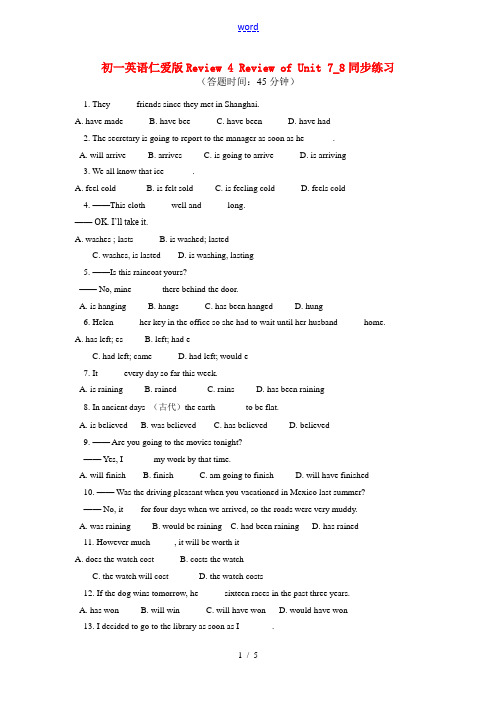
初一英语仁爱版Review 4 Review of Unit 7_8同步练习(答题时间:45分钟)1. They _____ friends since they met in Shanghai.A. have madeB. have beeC. have beenD. have had2. The secretary is going to report to the manager as soon as he ______.A. will arriveB. arrivesC. is going to arriveD. is arriving3. We all know that ice ______.A. feel coldB. is felt soldC. is feeling coldD. feels cold4. ——This cloth _____ well and _____ long.——OK. I’ll take it.A. washes ; lastsB. is washed; lastedC. washes, is lastedD. is washing, lasting5. ——Is this raincoat yours?—— No, mine ______ there behind the door.A. is hangingB. hangsC. has been hangedD. hung6. Helen _____ her key in the office so she had to wait until her husband _____ home.A. has left; esB. left; had eC. had left; cameD. had left; would e7. It _____ every day so far this week.A. is rainingB. rainedC. rainsD. has been raining8. In ancient days (古代)the earth ______ to be flat.A. is believedB. was believedC. has believedD. believed9. —— Are you going to the movies tonight?—— Yes, I ______ my work by that time.A. will finishB. finishC. am going to finishD. will have finished10. —— Was the driving pleasant when you vacationed in Mexico last summer? —— No, it ___ for four days when we arrived, so the roads were very muddy.A. was rainingB. would be rainingC. had been rainingD. has rained11. However much _____, it will be worth itA. does the watch costB. costs the watchC. the watch will costD. the watch costs12. If the dog wins tomorrow, he _____ sixteen races in the past three years.A. has wonB. will winC. will have wonD. would have won13. I decided to go to the library as soon as I _______.A. finish what I didB. finished what I didC. would finish what I was doingD. finished what I was doing14. You won’t know if the coat fits you until you _____ it on.A. will tryB. are tryingC. triedD. have tried15. My dictionary _______, I have looked for it everywhere but still _______.A. has lost; don’t findB. is missing; don’t findC. has lost; haven’t foundD. is missing; haven’t found16. —— How long ______ each other before they _____ married?—— For about a year.A. have they known; getB. did they know; were going to getC. do they know; are going to getD. had they known; got17. —— e in, Peter, I want to show you something.—— Oh, how nice of you. I _____ you _____ to bring me a gift.A. never think; are goingB. never thought; were goingC. didn’t think; are goingD. hadn’t thought; were going18. When Jack arrived he learned Mary _______ for almost an hour.A. had goneB. had set offC. had leftD. had been away19 ——I’m sorry to keep you waiting.—— Oh, not at all. I ______ here only a few minutes.A. have beenB. had beenC. wasD. will20. The police found that the house _______ and a lot of things ______.A. has broken into; has been stolenB. had broken into; had been stolenC. has been broken into; stolenD. had been broken into; stolen21. —— Have you moved into the house?—— Not yet. The rooms ________.A. are being paintedB. are paintingC. are paintedD. are being painting22. If the city noises _______ from increasing, people ______ shout to be heard at the dinner table 20 years from now.A. are not kept ; will have toB. are not kept; have toC. do not keep; will have toD. do not keep, have to23. —— ________ the sports meet might be put off.—— Yes, it all depends on the weather.A. I’ve been toldB. I’ve toldC. I’m toldD. I was told24. You don’t need to describe her. I _______ her several times.A. had metB. have metC. metD. meet25. I don’t think Jim saw me; he ______ into space.A. just stared (凝视)B. was just staringC. has just staredD. had just stared26. —— _______ my glasses?—— Yes, I _______ them on your bed a minute ago.A. Do you see; sawB. Had you seen; have seenC. Have you seen; sawD. Would you see; saw27. —— We could have walked to the station; it was so near.—— Yes. A taxi _______ at all necessary.A. wasn’tB. hadn’t beenC. wouldn’t beD. won’t be28. —— Who is Jerry Cooper?——______? I saw you shake hands with him at the meeting.A. Don’t you meet him yetB. Hadn’t you met him yetC. Di dn’t you meet him yetD. Haven’t you met him yet29. —— Nancy is not ing tonight.—— But she _______!A. promisesB. promisedC. will promiseD. had promised30. _______ it with me and I’ll see what I can do.A. When leftB. LeavingC. If you leaveD. Leave31. —— Can you attend the party tomorrow?—— I think I can when my headache ________ thoroughly.(完全)A. will disappearB. is disappearingC. disappearsD. is disappeared32. It is clear that his poor education _______ him back.A. has been heldB. is holdingC. will be heldD. had held33. —— How are you planning to travel to Shanghai?—— I ____ yet, but I ______ taking a train.A. haven’t decided; am consideringB. haven’t decided, considerC. didn’t decided; am consideringD. hadn’t decided; have considered34. The pen I _______ I _______ is on my desk, right under my nose.A. think, loseB. thought , had lostC. think , had lostD. thought, have lost35. —— Have you heard about the new school?—— No, when and where to build the new one _______ yet.A. is not decidedB. are not decidedC. hasn’t decidedD. haven’t decided36. ——Sorry, I’m late.——That’s OK. I _____ long.A. haven’t waitedB. don’t waitC. haven’t been waitingD. didn’t wait37. —— Nancy sat in the front seat on the left side of the classroom.—— Oh! I thought she ______ in the back.A. will sitB. had satC. is sittingD. has sat38. I must leave, too. I _______ having tea with you, Bill.A. was enjoyingB. am enjoyingC. enjoyedD. enjoy39. I ______ my face when suddenly someone ______ at the door.A. washed, knockedB. washed, was knockingC. was washing, was knockingD. was washing, knocked40. I ______ at the station half an hour ago, but the train _____ yet.A. arrived, hadn’t eB. was arriving, hadn’t eC. arrived, hasn’t eD. had arrived, didn’t e41. —— Why did you e by taxi?—— My car broke down last week and I still _______ it repaired.A. haven’t hadB. didn’t haveC. don’t haveD. won’t have42. I’m surprised to find you here looking well and playing tennis, Jim. Ann said that you _____ sick.A. areB. wereC. would beD. had been43. The price _________, but I doubt whether it will remain so.A. went downB. will go downC. has gone doneD. was going down44. —— Did you go to Qingdao for vacation last August?—— I _______ to go, but I got sick at the last minute.A. was planningB. had been planningC. plannedD. have planned45. I met him at a party, but I haven’t seen him ______.A. sinceB. stillC. yetD. then46. All the preparations for the task ________, and we’re ready to start.A. pletedB. pleteC. had been pletedD. have been pleted47. I finally got the job I dreamed about. Never in my life _____ so happy.A. did I feelB. I feltC. I had feltD. had I felt48. —— How are you today?—— Oh, I ________ as ill as I do now for a very long time.A. didn’t feelB. wasn’t feelingC. don’t feelD. haven’t felt49. The reporter said the UFO ______ east to west when he saw it.A. was travellingB. travelledC. had been travellingD. was to travel50. —— I think that you need ______ practice on playing the violin.——______ violin lessons every two weeks, but I think I’ll make it every week from now on.A. less; I haveB. less; I’ve takingC. more; I haveD. more; I’ve been having【试题答案】1——5 CBDAA 6——10 CDBDC 11——15 DCDDD 16——20 DBDAD 21——25 AAABB 26——30 CADBD 31——35 CBABA 36——40 CBCDC 41——45 ABCBA 46——50 DDDAD。
仁爱英语七年级下Unit5-6复习
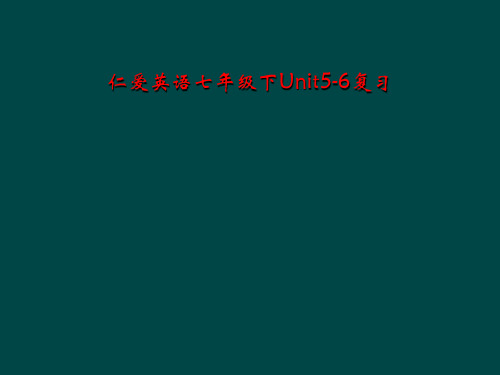
哪些主语属第三人称单数? 1.单数第三人称代词he, she, it单独作主语。 2.单个人名或称呼(如Tom, Miss Lin)作主语。 3.单数可数名词(如the girl, that (如anything, somebody)作主语。
5. What’s the time? _W__h_a_t_ _t_im__e__ is it?
三、完成句子。 1. We want to k_n_o_w__a_b_o__u_t (了解) your school life. 2. He _lo_o__k_s_h_a_p_p_y___ (看起来快乐) because he loves
二、划线部分提问。
1. Mike is playing computer games.
_W__h__a_t’_s__ Mike _d_o__in__g_ ?
2. His favorite sport is swimming.
_W__h_a_t __is___ his favorite sport?
2. He plays the guitar once a week. _H_o__w_ _o_f_te_n_ _d_o_e_s__ he play the guitar?
3. Those apples are twenty yuan. _H_o__w_ m__u_c_h_ _a_r_e__ those apples.
5. We are cleaning the classroom.
_W__h_a_t are you _d__o_in__g__ ?
TV. She _i_s_r_e_a_d_in__g_(read) an English book.
7. -Listen! Who i_s_s_i_n_g_i_n_g_(sing) in the next room? -I think it's Li Mei. She often
仁爱版英语七年级下册各单元知识点归纳
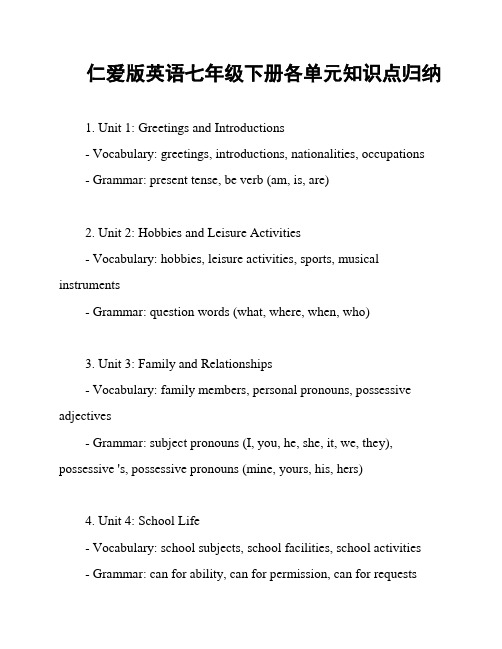
仁爱版英语七年级下册各单元知识点归纳1. Unit 1: Greetings and Introductions- Vocabulary: greetings, introductions, nationalities, occupations- Grammar: present tense, be verb (am, is, are)2. Unit 2: Hobbies and Leisure Activities- Vocabulary: hobbies, leisure activities, sports, musical instruments- Grammar: question words (what, where, when, who)3. Unit 3: Family and Relationships- Vocabulary: family members, personal pronouns, possessive adjectives- Grammar: subject pronouns (I, you, he, she, it, we, they), possessive 's, possessive pronouns (mine, yours, his, hers)4. Unit 4: School Life- Vocabulary: school subjects, school facilities, school activities- Grammar: can for ability, can for permission, can for requests5. Unit 5: Daily Routines- Vocabulary: daily activities, time expressions, adverbs of frequency- Grammar: simple present tense, adverbs of frequency (always, often, sometimes, never)6. Unit 6: Food and Drinks- Vocabulary: food items, drinks, restaurant vocabulary- Grammar: countable and uncountable nouns, quantifiers (some, any)7. Unit 7: Places and Directions- Vocabulary: places in town, prepositions of location, directions- Grammar: imperatives, there is/there are8. Unit 8: Transportation- Vocabulary: means of transportation, travel vocabulary- Grammar: past tense (regular and irregular verbs), past tense of be verb (was, were)以上是仁爱版英语七年级下册各单元的知识点归纳。
仁爱英语七年级下册短语复习总结
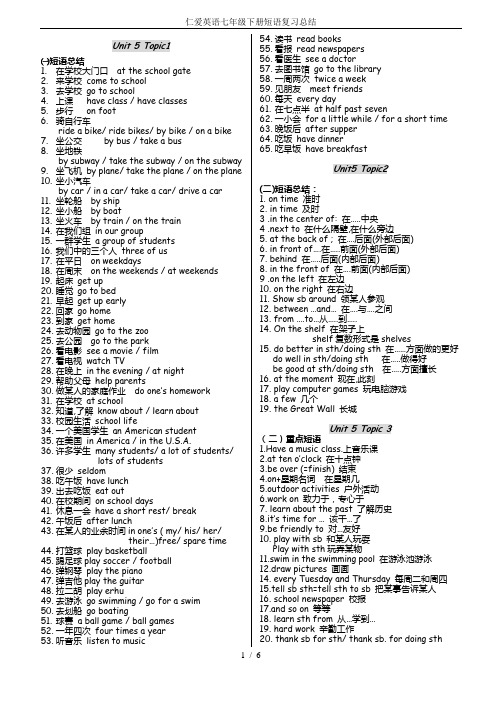
Unit 5 Topic1㈠短语总结1.在学校大门口at the school gate2.来学校come to school3.去学校go to school4.上课have class / have classes5.步行on foot6.骑自行车ride a bike/ ride bikes/ by bike / on a bike7.坐公交by bus / take a bus8.坐地铁by subway / take the subway / on the subway9.坐飞机by plane/ take the plane / on the plane10.坐小汽车by car / in a car/ take a car/ drive a car11.坐轮船by ship12.坐小船by boat13.坐火车by train / on the train14.在我们组in our group15.一群学生a group of students16.我们中的三个人three of us17.在平日on weekdays18.在周末on the weekends / at weekends19.起床get up20.睡觉go to bed21.早起get up early22.回家go home23.到家get home24.去动物园go to the zoo25.去公园go to the park26.看电影see a movie / film27.看电视watch TV28.在晚上in the evening / at night29.帮助父母help parents30.做某人的家庭作业do one’s homework31.在学校at school32.知道,了解know about / learn about33.校园生活school life34.一个美国学生an American student35.在美国in America / in the U.S.A.36.许多学生many students/ a lot of students/lots of students37.很少seldom38.吃午饭have lunch39.出去吃饭eat out40.在校期间on school days41.休息一会have a short rest/ break42.午饭后after lunch43.在某人的业余时间in one’s ( my/ his/ her/their…)free/ spare time44.打篮球play basketball45.踢足球play soccer / football46.弹钢琴play the piano47.弹吉他play the guitar48.拉二胡play erhu49.去游泳go swimming / go for a swim50.去划船go boating51.球赛a ball game / ball games52.一年四次four times a year53.听音乐listen to music 54.读书read books55.看报read newspapers56.看医生see a doctor57.去图书馆go to the library58.一周两次twice a week59.见朋友meet friends60.每天every day61.在七点半at half past seven62.一小会for a little while / for a short time63.晚饭后after supper64.吃饭have dinner65.吃早饭have breakfastUnit5 Topic2(二)短语总结:1. on time 准时2. in time 及时3 .in the center of: 在…..中央4 .next to 在什么隔壁,在什么旁边5. at the back of ; 在….后面(外部后面)6. in front of….在…..前面(外部后面)7. behind 在…..后面(内部后面)8. in the front of 在….前面(内部后面)9 .on the left 在左边10. on the right 在右边11. Show sb around 领某人参观12. between …and… 在….与….之间13. from ….to…从…..到…..14. On the shelf 在架子上shelf复数形式是shelves15. do better in sth/doing sth 在……方面做的更好do well in sth/doing sth 在…..做得好be good at sth/doing sth 在…..方面擅长16. at the moment 现在,此刻17. play computer games 玩电脑游戏18. a few 几个19. the Great Wall 长城Unit 5 Topic 3(二)重点短语1.Have a music class.上音乐课2.at ten o’clock 在十点钟3.be over (=finish) 结束4.on+星期名词在星期几5.outdoor activities 户外活动6.work on 致力于,专心于7. learn about the past 了解历史8.it’s time for … 该干…了9.be friendly to 对…友好10. play with sb 和某人玩耍Play with sth玩弄某物11.swim in the swimming pool 在游泳池游泳12.draw pictures 画画14. every Tuesday and Thursday 每周二和周四15.tell sb sth=tell sth to sb 把某事告诉某人16. school newspaper 校报17.and so on 等等18. learn sth from 从…学到…19. hard work 辛勤工作20. thank sb for sth/ thank sb. for doing sth因某事而感谢某人21. run on the playground 在操场跑步 22. watch animals 看动物23. play soccer at school 在学校踢足球 24. read a book at home 在家看书25.have dinner in the school dinning hall 在学校餐厅吃饭Unit 6 Topic 1 (一)重点短语: 在第二层 building has four floors. I am on the first floor.) 2. go upstairs ( adv.)上楼; go downstairs 下楼 3. a moment later 过了一会儿 4. play with sb 和某人一起玩 play with sth. 玩弄某物 5. in front of 和in the front of 区别:加the 的词组表示物体内部的前面 6. on the wall 在墙上 in the wall 7. on the tree (苹果) in the tree (鸟) 8. a model plane 模型飞机 9. play on the computer 玩电脑 (比较play computer games 玩电脑游戏) Unit 6 Topic 2 (一)重点短语 1. 在农村 in the country 在郊区 in the suburb2.一套三居室的房子3.. call sb. at +电话号码 ,4.a quiet double room under 300yuan per month 300元5.house with furniture for a family of three 适合三口之家,家具齐全的房子6.rent sth. to sb. 把某物租给某人 rent sth. from sb. 从某人那租某物 8.on the street corner 在街角 9. keep money 存钱 10.寄信 mail (post) letter 11.see a doctor 看医生 12.month 的复数 months munity service center in our area 15.靠近 be close (adj.) to / close (adv.) to / near / next to (紧靠) 【反义词是 far from 】 16. right now 马上,立刻= at once 17.Children’s Day 儿童节 ; 18.Teachers’ Day 教师节 ; 19.Women’s Day 妇女节Uint 6 Topic 3 1. = take the second street(turning) on the left 2. go across (prep.) the bridge = cross (v.)the bridge 过桥 3. across from 在….的对面 4. on the road 在路上 on/ in the street 在街上 5. on the corner of the street 在街角(比较in the corner of 和at the corner of ) 6. bet ween….and ….在…和….之间 7. walk on 继续走8 public phone 公用电话9. at the traffic lights 在红绿灯处 10. No right turn 禁止右转 No parking 禁止停车Go straight 直走11. be in danger 处于危险之中 12. get hurt 受伤(get 系动词,hurt 是形容词) 13. lose one’s life 失去了某人的生命 14. obey the traffic rules 遵守交通规则 15. a ticket for speeding/ drinking and driving/parking in the wrong place/ making a wrong turn 超速/酒后驾车/乱停车/转错弯罚单 16. make a wrong turn 转错弯 17. keep quiet in class. 上课时要安静。
英语仁爱版七年级下学期总复习ppt课件

认识到了贫困户贫困的根本原因,才 能开始 对症下 药,然 后药到 病除。 近年来 国家对 扶贫工 作高度 重视, 已经展 开了“ 精准扶 贫”项 目
英语(仁爱版) 七年级(下)学期总复习
8、现在进行时中动词现在分词的构成及发音规则: 一般在动词末尾加ing. 以不发音字母e结尾的动词,先去e再加ing. 以重读闭音节结尾的动词,如果结尾只有一个辅音字母,应先双写该字母
7、一般现在时的用法 1)表现在的状态。如:I am in class 3,grade 1.我在一年级三班。 2)表经常性、习惯性的动作或存在的状态,长与表示频率的副词连用。如:
I usually go to school on foot.(=I usually walk to school.) 3)表主语具备的性格和能力等。如:She likes baseball games.她喜欢棒
get up at six. 主语(He/She/It)+doesn't+V.原形+其它。如:He/She/It doesn't get up
at six. 5、一般疑问句及其回答: Do+I/You/We/They+V.原形+其它? --Yes,I/We/They do.No,I/We/They don't. Does+he/she/it+v.原形+其它? --Yes,he/she/it does.No,he/she/it doesn't.
仁爱版英语七年级下册知识点复习归纳(完整版)

仁爱版英语七年级下册知识点归纳英语七年级下册知识点归纳Unit 5 Topic1重点语法一般现在时(常与频度副词never, seldom, sometimes, often ,usually, always等连用)重点句型—How do you usually come to school?—I usually come to school by subway.—How often do you go to the library?—Once/Twice/Three times a week/Very often/Every day/Seldom重点详解1I always come to school by bus.by+交通工具名称,表示使用某种交通方式,中间不加限定词,如果交通工具前有a, the, my 等限定词,就不能用by,而是用in或是on.on the train=by train on his bike=by bike in my car=by car.巧辩异同on foot 与walk on foot “走路”,是介词短语,不能作谓语,只作方式状语,位于句末。
walk “走路”,是动词,可以作谓语。
go to…on foot= walk toI often go to school on foot. =I often walk to school.同样,go to….by bike = ride a bike togo to…. by car = drive a car togo to … by plane = fly togo to… by bus = take a bus to2 Come on! It’s time for class. come on “快点,加油,来吧”。
It’s time for sth. “该做某事了”,与 It’s time to do sth.意思一样。
仁爱版七年级英语下册总复习重点短语和句型

仁爱版七年级下英语总复习材料Unit 5 Our School LifeTopic 1 how do you usually go to school ?1.at the school gate 在学校大门口2.Happy New Year! 新年快乐3.The same to you! 也同样祝你--- ---4.looks very nice! 看起来漂亮e to school 来上学e by bike= ride(s) a bike 骑自行车7.go by subway=take(s) the subway= in asubway乘地铁8.go by bus=take (s) a bus / in a bus / on abus 乘公共汽车9.by plane / by air /in a plane / on a plane乘飞机10.by car /in a car / take a car 坐小汽车11.by train / in a train / on a train / take atrain乘火车12.by ship/by boat / on a ship/boat / take theship 坐船13.go on foot=walk to 步行14.walk to school 走路上学15.watch TV 看电视16.do one`s homework 做家庭作业17.see a movie 看电影18.Good evening 晚上好19.want to do sth 想要做某事20.what time 什么时间21.get up起床22.on weekdays 周末23.at about six o’clock 在大约六点钟e on 快点25.It`s time for class 该上课了26.It`s time to have class 该上课了27.know about 了解--- --- 的情况28.school life 学校生活29.American students 美国学生30.take a yellow school bus 乘一辆黄色的校车31.have/has lunch 吃午餐32.at school 在学校,在上学33.eat out外出吃饭,上馆子34.on school days 在校期间35.have a short rest休息一会儿36.after lunch午餐后37.after supper/after dinner 晚饭后38.after class下课后39.after school放学后40.listen to music 听音乐41.read books看书42.go to the park 去公园43.go to the zoo去动物园44.go to the library去图书馆45.go to school去上学46.go to work去上班47.school is over 放学了48.class is over 下课了49.in one`s free/spare time50.在某人的业余时间里51.play basketball 打篮球52.play soccer 踢足球53.go swimming 去游泳54.go shopping 去买东西55.go fishing 去钓鱼56.go skating 去滑旱冰57.go skiing 去滑冰58.go climbing mountains 去爬山59.go hiking 去远足60.how often多久一次61.ball games 球赛62.have ball games 举行球赛63.four times a year 每年四次64.meet friends 见朋友65.once a week 每周一次66.twice a week 每周两次67.three times a week 每周三次68.Work must come first! 工作〔学习〕必须放在第一69.twenty past six 六点过二十分70.at twenty past six 在六点二十分71.have / has breakfast 吃早餐72.have / has lunch 吃午餐73.have / has supper 吃晚餐74.have / has dinner 吃晚餐75.half past seven 七点半76. a quarter past five 五点过十五分77.get home 到家78.go / goes to bed 上床睡觉79. a quarter to ten 十点过十五分80.drive a car 开小汽车81.the Great Wall 长城Topic 2 He is playing soccer on theplaygroundputer room 电脑室2.dining hall 食堂3.teachers` office 教师办公室4.classroom building 教学楼5.swimming pool 游泳池6.in the library 在图书馆7.in the dormitory 在宿舍里8.in the dining hall 在食堂里9.on the playground 在操场上10.at the moment = now此刻,现在11.clean the dormitory打扫宿舍12.clean the bedroom 打扫卧室13.clean the classroom 打扫教室14.clean the blackboard擦黑板15.make cards 制作卡片16.Would you like to --- --- ?17.你想做--- --- 吗?18.Good idea!好主意19.See you soon 一会儿见20.play computer games 玩电脑游戏21.May I borrow --- --- 我可以借--- ---吗?22. a few几个,一些23.Ren’ai Project English workbooks 仁爱英语练习册24.of course = sure = certainly 当然25.on time 准时26.in time 及时27.many students 许多学生28.do well in= be good at sth / doing sth在--- ---做得好29.do better in 在--- --- 做得更好30.31.on the shelf 在书架上32.return = give back 归还33.It’s a pleasure 不用谢34.Thank you all the same 还是要谢谢你35.lost and found 失物招领处36.looking for 寻找37.some money 一些钱38. a picture of my family 一张全家福照片39.thank you all the same 还是要谢谢你40.school student card 学生卡41. a pair of pants 一条裤子42. a pair of shoes 一双鞋43.two pairs of shoes 两双鞋44.singing in the room 在房间里唱歌45.dancing in the gym 在体育馆跳舞46.swimming in the gym 在体育馆游泳47.show sb around 带领某人参观48.in the center of= in the middle of 在------ 的中间,在--- --- 的中央49.on the left 在左边50.on the right 在右边51.next to 在--- --- 隔壁,在--- ---旁边,紧挨看,靠近52.at the back of 在--- ---后部,在--- --- 后53.near the playground 在操场的附近54.in the gym 在体育馆里,在健身房里55.in the swimming pool在游泳池里56.talk about their families 谈论他们家庭57.Attention, please ! 请注意!58.between --- and --在--- --- 和--- --- 之间59.stamp collection show 集邮展60.school hall 学校大厅61.every Saturday 每个星期六62.he is running 他在跑步63.in picture 1 在第一张照片里64.in picture 2 在第二张照片里65.look(looks) happy 看起来高兴66.love swimming 喜欢游泳67.talk to a Japanese girl和一个日本女孩交谈68.play the guitar 弹吉它69.in the classroom 在教室里70.in the office 在办公室里71.in the dormitory 在宿舍里72.on the playground 在操场上Topic 3 our school is very interesting1.What day 用来提问“星期几”2.have a music class 上一节音乐课3.at ten o`clock 十点钟4. a quarter to eleven 十点四十五分5.have a biology lesson上一节生物课6.have a geography 上一节地理课7.have a P.E. lesson 上一节体育课8.have an art lesson 上一节美术课9.outdoor activities 户外活动10.how many lessons 多少节课11.every week 每周12.singing and dancing唱歌跳舞13.drawing pictures 画画14.Working on math problems 做数学题15.speaking English 说英语16.learning about the past 了解过去17.an English book 一本英语书18.What do you think of it = How do youlike it ? 你觉得它怎么样?19.Difficult and boring 难学而且乏味20.Which subject 哪一门课21.Easy and interesting 容易又有趣22.Favorite subject 最喜欢的科目23.My school life 我的学校生活24.At school 在学校里,在上学25.Be friendly to sb = be kind to sb 对某人友好26.In the morning 在上午,在早晨27.In the afternoon 在下午28.I aften speak English with my classmates我经常和我的同学说英语29.After school 放学后30.Play basketball with my classmates和同学们打篮球31.On the playground 在操场上32.Every Tuesday 每周二33.Every Thursday 每周四34.school newpaper 校报35.School Time 校园时代36.And so on 等等37.Science Today 当代科学38.Thank sb for doing sth 感谢某人做了某事39.best wishes 致以美好的祝愿40.read stories 看故事书41.have a biology class 上生物课42.have breakfast 吃早饭43.run on the playground 在操场上跑步44.have a physics class上物理课45.watch animals 欣赏动物46.play soccer at school 在学校踢足球47.read a book at home 在家看书48.have dinner in the school dinning hall在学校食堂吃晚饭49.have dinner at home 在家吃晚饭Unit 6 Our Local AreaTopic 1 Is there a sofa in your study?1.On the second floor 在二楼2.Why not =Why don`t you为什么不--- --- ?3.Go upstairs 上楼4.Go downstairs 下楼5.Have a look 看一看6. A moment later 过了一会儿e in ,please 请进8.So many books 这么多的书9.On the shelf 在书架上10.You have a nice study你的书真漂亮!11.Dining room 餐厅12.Living room 客厅13.On the first floor 在一楼14.Cousins 表姐妹,表兄弟15.In the front of the house 在房子前面16.In the kitchen 在厨房17.In the study 在书房18.In the dinning room 在餐厅19.In the bedroom 在卧室20.In the garden 在花园21.Behind the door 在门后面22.Play with his pet dog和他的宠物狗玩耍23.Play games 玩游戏24.Clean the car 清洗小汽车25.Read books 看书26.Have dinner 吃饭27.Talk about 谈论28.Near my desk 在我桌子旁29.On your desk 在你桌子上30.So on 等等31.My family photo 我的全家福照片32.On the wall 在墙上33.Put them away 请把它们收起来放好34.Put it away,please把它/它们收起来放好35.Look after = take care of 照看,照顾36.In front the house 房子前面37.In the bottle 瓶子里38.Near the window 窗户边39.In the glass 杯子里40.Model planes 飞机模型41.Under the bed 床下42.How many pairs 多少双43.In the tree 树上44.On the tree 树上45.On the shelf 书架上46.On the river 河里47. A small garden 一个小花园48.Many beautiful flowers 许多美丽的花49.In the garden 花园里50. A big tree 一棵大树51.Under the tree 在树下52.Very beautiful 非常漂亮53. A large living room 一个在客厅54. A dining room 一个餐厅55. A kitchen 一个厨房56. A bathroom 一个卫生间57.I like watching TV in the living room我喜欢在客厅里看电视58.I love playing on the computer in thestudy我喜欢在书房里玩电脑59.In the drawer 在抽屉里60.On the chair 在椅子上61.Under the chair 在椅子下62.In picture A 图A里63.In picture B 图B里64.On the walls 在墙上65.In 在--- --- 里面66.On 在--- --- 上面67.Behind 在--- --- 下面68.Near 在--- --- 附近69.Next to 在--- --- 旁边70.In the front of 在--- --- 前面71.Don`t put it / them here 别把它/它们放在这儿72.Write a letter 写一封信73.Describe different rooms in your home描述你家不同的房间74.The things around your home 房子周围的事物75.I`m very glad to 我很高兴76.Get a letter from sb= hear from sb 收到某人的来信77.Tell sb about sth 告诉某人关于某事78.Tell sb to do sth 告诉某人做某事79.Tell sb sth 告诉某人某事Topic 2 What`s your home like?1.What`s your home like? 你家是什么样的?2.An apartment building 一座公寓3. A town house 城镇住宅4.Live with sb 和某从居住在一起5.Your grandparents 你的爷爷和奶奶6. A big farmhouse 农舍7.In the country 在农村8.Look for 寻找9.Let`s help him 我们去帮助他吧10.In our group 在我们小组11.For rent 出租12.Wanted 求租13.Small apartment for students小型学生公寓14.¥850 a month 每月850元15.Call Ms. Zhang 联系张女士16.House with three bedrooms 一套三居室的房子17.House with furniture for a family of three适合三口之家,家具齐全的房子18.Looking for a quiet double room 求租一间安静的双人间under ¥300 per month 月租低于300元19.Apartment for a family of two 适合两口之家的公寓20.House with four bedrooms 四居室21.Quiet double room 安静的双人间22.Excuse me 打搅了,打搅一下,劳驾,23.Your new neighbor 你的新邻居24.I`m looking for a store我在找一家商店25.On the street corner 在街道拐角处26.Post office 邮局27.Bookstore 书店28.Museum 博物馆29.Parking lot 停车场30.Supermarket 超市31.Hospital 医院32.Bank 银行33.Train station 火车站34.Park cars 停车35.Keep money 存钱36.Take trains 乘火车37.See a doctor 看医生38.Buy food 买食物39.Mail letters 邮寄信40.Buy books 买书41.Keep and show things保存和陈列物品42.Bookstored 书店43.Restaurant ['restərənt] 饭店44.I`m afaid it`s too loud 恐怕声音有点儿大45.I`m really sorry about that 十分抱歉46.At the end of 、Road 在、、、路的尽头47.On the right 在右边48. A tall tree 一棵大树49.Lot of = lots of 许多50.Tall buildings 高楼51.Small gardens 小花园52.Close to 离--- --- 近,紧挨着的53.Far from 离--- --- 远54.Not far from 离--- --- 不远55.Call it for help 打向它求助56.How is the community? 社区是什么样的?57.Living near your home 住在你家附近58.Do you like living there?59.This is linda speaking. 我是琳达60.61.What`s the matter? 有什么事吗?62.There is something wrong with =Something is wrong with某人/某物出问题,有毛病了63.Right now 立刻,马上64.From--- to--- 从--- --- 到--- ---65.The traffic is heavy 交通拥挤66.The cost of living is high生活费用高67.Houses with big yards带大院子的房子68. A house with a garden 有花园的房子Topic 3 How can I get to the bookstore?1.Go up this street to the end 沿着这条街一直走到尽头2.On your left 在你左边3.How can I get to--?我怎样才能去--- --- ?4.Go along Xinhuan Street 沿着新华路走5.Turn left at the first street 在第一条街口向左转6.Go across the bridge 穿过桥7.It`s about one hundre meters along on theright 顺着右边走大约100米〔就到〕8.Which is the way to--- ? 哪一条是到--- --- 路?9.The post office 邮局10.I`m new here 我对这儿不熟11.On 在--- --- 上面12.On the corner of 在--- --- 拐角处13.Across from 在--- --- 正对面14.Between --- and --在--- --- 和--- ---之间15.Near the bridge 在桥的附近16.Turn left and walk on 向左拐并一直往前走17.You can`t miss it 你不会错过的18.Beitai Road 北台路19.Be --- away from 离--- --- 远20.Need to do sth 需要做某事21.Take bus No.718 乘坐718路车22.Change to the No.108 bus at AnzhenBridge 在安贞桥换乘108路车23.The way to Shuanxiu Garden 去双秀花园的路24.At Liuli Bridge 六里桥25.How far “多远”,问距离。
仁爱版七年级(下册)知识点汇总

仁爱版七年级(下册)知识点汇总仅限于第三人称单数,如he。
she。
it)I usually do XXX(改写)How often do you do your homework at school。
(改写)Looking the same means they have similar appearances。
(改写)XXX(改写)I am looking for my keys。
(改写)I need to look after my little brother。
(改写)I do XXX at school sometimes。
(改写)XXX phrase "come on" means to hurry up or XXX。
"It's time for class" means that it is time to attend class。
(改写)I usually come to school by subway。
(无需改写)How often do you visit the library。
(改写)I go to the library twice a week。
(改写)XXX in learning about the school life of American students.To know about means to have knowledge or n about something.A few means some。
while few means not many or almost none。
and they are used to modify countable nouns.A little means some。
while little means not much or almost none。
and they are used to modify XXX.XXX soccer。
七年级英语仁爱版下册复习.ppt

重要句型
1.What day is it today?It’s Sunday / Monday / Tuesday / Wednesday / Thursday / Friday / Saturday.(英语每周的第一天是星期天)
2. What class are they having ? They are having a music class.
20. at the school gate 油 22. get up 24. at school 26. and so on
在校门口
21. come on
起床
23. talk with / to sb.
在学校、在上课 25. go to school
……等等
快点 、 加
与某人谈话 去上学
三.语法:表时间频率的副词:
9.on Monday /Monday morning
在星期一/在星期一的早上
10. tell sb. about sth
告诉某人关于某事
语
法:
一般现在时: 主语+ 动词原形/ 动词第三人称单数s/es + 其他。
表示经常或习惯性的动作。
常与频率副词:never 从来不 seldom 极少 sometimes 有时
容易又有趣
3. difficult and boring
又难又乏味
4. be friendly to sb. =be kind to sb.
对某人友好
5. between…and…
在……之间…
6.learn…from…
பைடு நூலகம்
向……学习……/ 从…中学……
7. from…to…
仁爱版英语七年级下册知识点复习归纳
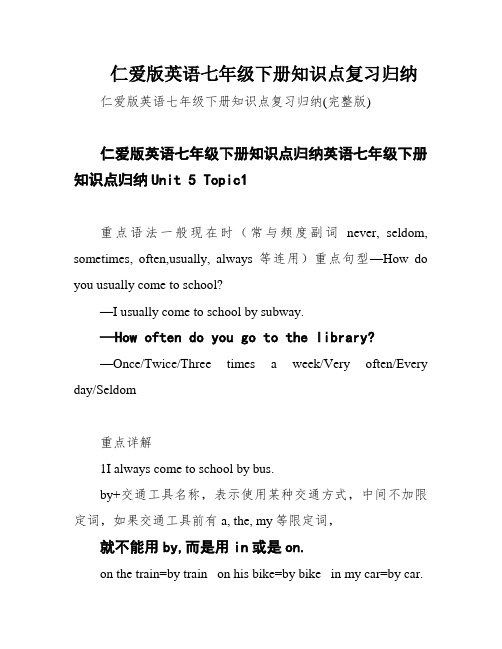
仁爱版英语七年级下册知识点复习归纳仁爱版英语七年级下册知识点复习归纳(完整版)仁爱版英语七年级下册知识点归纳英语七年级下册知识点归纳Unit 5 Topic1重点语法一般现在时(常与频度副词never, seldom, sometimes, often,usually, always等连用)重点句型—How do you usually come to school?—I usually come to school by subway.—How often do you go to the library?—Once/Twice/Three times a week/Very often/Every day/Seldom重点详解1I always come to school by bus.by+交通工具名称,表示使用某种交通方式,中间不加限定词,如果交通工具前有a, the, my等限定词,就不能用by,而是用in或是on.on the train=by train on his bike=by bike in my car=by car.巧辩异同on foot与w alk on foot“走路”,是介词短语,不能作谓语,只作方式状语,位于句末。
walk“走路”,是动词,可以作谓语。
goto…onfoot= walk toI often go to school on foot. =I often walk to school.仁爱版英语七年级下册知识点复习归纳(完整版)同样,go to….bybike = ride a bike togoto….by car = drive a car togo to…by plane = fly togoto…b y bus = take a bus to2 Come on!It’stime for class. come on“快点,加油,来吧”。
It’stime for sth.“该做某事了”,与It’stime to do sth.意思一样。
